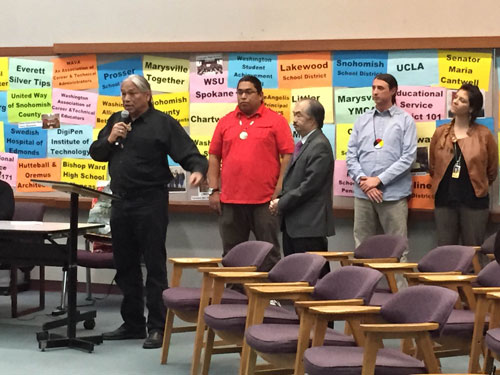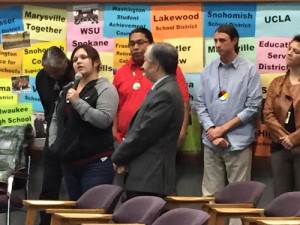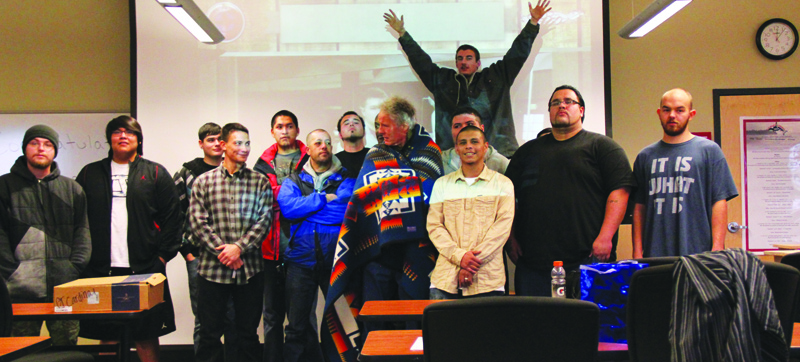By Kara Briggs-Campbell, Tulalip News
“I love you too much to let you hurt yourself,” Robert Macy, a psychologist who works international trauma relief, said as he talked to the Tulalip tribal community about how to interrupt the thoughts of a youth who is considering killing themselves.
Macy, who is president of the International Trauma Center in Boston, met Thursday, December 4 with tribal member families, tribal staff and staff from area schools, to share techniques of traumatic incident stress interventions. Macy and a team of 100 specialists have worked in communities worldwide after natural disasters, terrorist acts and violent events.
Any effort to bring healing to the trauma that the Tulalip community feels will be built upon a combination of “Western medical practice, international tribal techniques for healing, and Tulalip’s own creativity and ingenuity,” Macy said.
At Macy’s request, no names or direct quotes from those who participated in sessions on Thursday will be shared in this article. Macy made this request out of concern that tribal members and staff be able to speak freely about their concerns in a confidential setting. Instead, the focus of this article is on Macy’s techniques for treating youth in trauma and helping communities with a history of trauma.
“After a traumatic event, your body goes into a higher level of adrenaline to absorb the shock,” he said. “Your adrenaline in this community was elevated for several weeks with the deaths and funerals.”
Your body’s emergency response to a threat is a good thing when there is a threat, but it’s a problem when the danger is gone and the child or adult can’t calm down to go to sleep or go to school or work. This is a sign that the nervous system is flooded with chemicals that keep you on edge and don’t let you calm down.
In this state of trauma, a fishnet, speaking figuratively, must be unfurled to catch every youth and every child who is reeling from the unexplainable and unimaginable events of the past weeks, or the past months and years when other violent traumatic events impacted the tribal community.
“We don’t look for the kids who look like they are the ones in trouble,” Macy said. “We look at all the kids.”
To do this, Macy’s groups works with the community to create and train teams of community members, “from the bus driver to the bartender,” and from the mental health staff to the parents, to intervene with kids and cope with conversation.
It begins with, are you thinking of hurting yourself? “I say to teens, don’t go into that dark corner, don’t go in there alone. Don’t let the light go out,” he said. “I love you too much to let you hurt yourself. The elders love you too much. Invoke the tribe. The tribe loves you too much to let you hurt yourself.”
With youth who are considering suicide, Macy said, “They are thinking, ‘I am dirty and disgusting. The world will be a better place without me.’” Amid those thoughts, suicide might seem to be the only option for some. The intervention is that there are more options.
At the same time, Macy advised that the Tulalip community agree and communicate that suicide is not only a bad choice, but it is also a taboo that is unacceptable in this community, he said.
For parents and trusted adults, he said it is important to find out what your kid really cares about, what matters the most to them. To do this requires the adult to come to a non-judgmental place of compassion and calm, because what the kid shares might be revolting to you. But finding this out will make a bridge that will help you reach your child, he said.
Some youth may need hospitalization, some may need medicine, and many others simply need outpatient counseling, programs and community engagement. The good news is that trauma is highly treatable as long as it isn’t suppressed and silenced.
“Trauma that is silenced will end in violence,” Macy said.
No decisions have been made by the Tulalip Tribes about what the next steps will be.
Macy said the important thing is to look at the strengths the Tulalip community has, including the resiliency of the Tulalip ancestors, the loving tribal children and parents, and the Tulalip community that is committed to finding a path to healing.
Where to call for help 24 hours a day, 7 days a week, 365 days a year
The Tulalip Tribes’ Behavioral Health Family Services has worked tirelessly since the tragic shooting on Oct. 24 to provide mental wellness to anyone in the tribal community who needs help. Behavioral Health also knows that in crisis, people need help around the clock. Here is a list of the phone numbers with descriptions about the focus of each crisis line.
To report an emergency dial 911
On the Tulalip Reservation and in Marysville, our 9-1-1 calls are answered by SNOPAC, a regional public safety communications center that receives law enforcement, fire and medical 9-1-1 calls for 37 different Snohomish County jurisdictions. It’s staff of “highly trained and dedicated professionals are available 24x7x365,” as stated on SNOPAC’s website. SNOPAC’s Core Values are Integrity, Respect, Professionalism and Teamwork. Learn more at http://www.snopac911.us/.
National Suicide Prevention Line: 1-800-273-TALK (8255)
The National Suicide Prevention Line, http://www.suicidepreventionlifeline.org/, is a crisis center in the Lifeline Network. After you call, you will hear a message saying you have reached the National Suicide Prevention Lifeline. Then you will hear hold music while your call is routed to a skilled, trained crisis worker who will listen to your problem. “No matter what problems you are dealing with, we want to help you find a reason to keep living. By calling, you’ll be connected to a skilled, trained counselor at a crisis center in your area, anytime 24/7.”
Snohomish County Crisis Line: 1-800-584-3578
The Snohomish County Crisis Line connects callers with a mental health clinician, who will provide emotional support and crisis intervention to individuals in crisis or considering suicide. In addition to the 24 Hour Crisis Line, an online chat also offers crisis services through Care Crisis Chat for those who prefer to access care via the Internet. Learn more at http://www.voaww.org/Get-Help/Behavioral-Health-Services – sthash.uKHLCR79.dpuf.
Crisis TEXT Line: Text “Listen” to 741-741
The Crisis TEXT Line, http://www.crisistextline.org/get-help-now/, states, “Millions of teens are quietly suffering every day. They struggle with bullying, homophobia, suicidal thoughts and more. The solution is beautifully simple: We provide crisis intervention services to teens via a medium they already use and trust: text. And we use insights from our work to develop and share innovations in prevention, treatment, and long-term care.” It is a program of DoSomething.org, one of the largest non-profit organizations for young people and social change.
24 Hour Crisis Line: 1-866-427-4747
Based in King County, the Crisis Line provides crisis assistance. “We need to talk with you directly on the phone. By talking with you anonymously and confidentially, we are best able to work with you to find help,” the Crisis Line states on its website, http://crisisclinic.org.
TEENLINK: 1-866-833-6546
Based in Seattle and open from 6 p.m. to 10 p.m. nightly, TEENLINK puts teens in touch with professionally trained youth volunteers, ranging in age from 15 to 20. “If you need to talk, our volunteers are there to listen and help you find youth-friendly resources in our community,” the TEENLINK website states. About 10 percent of callers are considering suicide, the other 90 percent want to talk about topics such as relationships, problems at school, drugs and alcohol, self harm, grief and loss, dating violence, family problems, eating disorders, and much more. For more information visit, http://866teenlink.org/about-teen-link

















